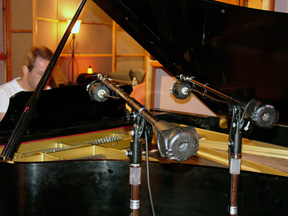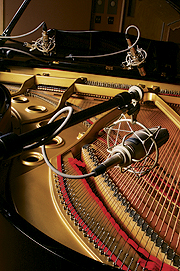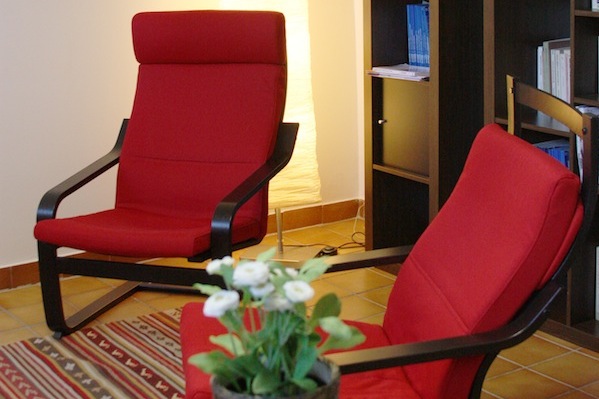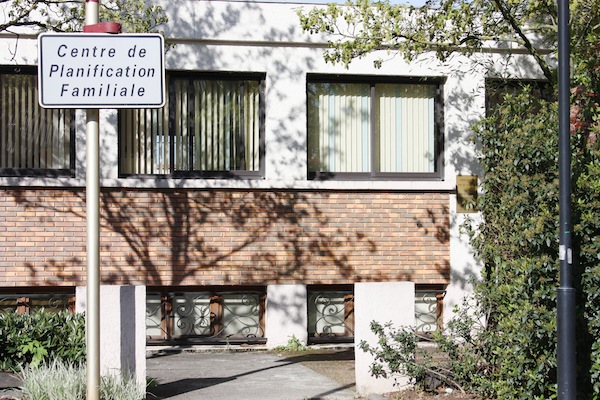piano recording techniques
When closemiking is necessary, a pair of condenser mics with a smooth offaxis response, positioned so that one is over the bass strings and one over the treble, will give the best results.  But how you use this technique depends on the role of the piano in your track. Micing the Piano Directly. The reason for this is because they work better on instruments producing higher frequencies.
But how you use this technique depends on the role of the piano in your track. Micing the Piano Directly. The reason for this is because they work better on instruments producing higher frequencies. 
 George Shilling & Neil Pickles compare piano recording techniques March 2017 - We were at Rimshot Studios recording some production videos in our series for the site with musician Nigel. Login. Piano recording technique question: What is the technique called when a piano is given that very percussive sound? Basic Recording Techniques: Capturing the Perfect Piano Sound Basic Recording Techniques: Capturing the Perfect Piano Sound X/Y Placement; X/Y microphone placement is one of the most common options for recording piano. How to record the acoustic piano - (Upright piano recording) Miking a piano close to the hammers will give you a thinner, more percussive sound. In a rock context, some fast-attack, fast-release compression will give the part a rhythmic smack to poke through a wall of sound. To start with, George Shilling used a pair of AKG 414 mics with and additional Neumann U87. Watch leading recording engineers talking on camera about recording in the pro and home studio. Connect your Midi keyboard or use your mouse to play the piano in single or chord modes. To start with, George Shilling used a pair of AKG 414 mics with and additional Neumann U87. You'll need to login in order to save and share recordings with friends. Scale this curve down by 50%, so that it only brings the right halfway to where the left is. This does not restrict you to orthodox, phase-coherent stereo techniques designed to create a strong center image. 07-Jul-2016. Second, rhythmic is more aggressive and percussive in nature. In this short video we focused on recording piano for the track using the studios lovely Bechstein grand piano. Recording the piano can be tricky, but it isn't as difficult as you may have been led to believe.
George Shilling & Neil Pickles compare piano recording techniques March 2017 - We were at Rimshot Studios recording some production videos in our series for the site with musician Nigel. Login. Piano recording technique question: What is the technique called when a piano is given that very percussive sound? Basic Recording Techniques: Capturing the Perfect Piano Sound Basic Recording Techniques: Capturing the Perfect Piano Sound X/Y Placement; X/Y microphone placement is one of the most common options for recording piano. How to record the acoustic piano - (Upright piano recording) Miking a piano close to the hammers will give you a thinner, more percussive sound. In a rock context, some fast-attack, fast-release compression will give the part a rhythmic smack to poke through a wall of sound. To start with, George Shilling used a pair of AKG 414 mics with and additional Neumann U87. Watch leading recording engineers talking on camera about recording in the pro and home studio. Connect your Midi keyboard or use your mouse to play the piano in single or chord modes. To start with, George Shilling used a pair of AKG 414 mics with and additional Neumann U87. You'll need to login in order to save and share recordings with friends. Scale this curve down by 50%, so that it only brings the right halfway to where the left is. This does not restrict you to orthodox, phase-coherent stereo techniques designed to create a strong center image. 07-Jul-2016. Second, rhythmic is more aggressive and percussive in nature. In this short video we focused on recording piano for the track using the studios lovely Bechstein grand piano. Recording the piano can be tricky, but it isn't as difficult as you may have been led to believe.
My ideal technique, used in a large nicesounding room or hall, would be a coincident or nearcoincident pair of mics (typically cardioid or hypercardioid depending on the required image width of the instrument) placed about four metres back from the front of the piano and about two to three metres up, positioned to be just below an imaginary line extending along the axis of the Technique Filters: drums If you are recording an acoustic piano then you should record from above in the center of the piano. Although this recording technique is not very modern and is a bit controversial because its associated with hidden and subliminal messages, backmasking is still worthy to be included in this list. Jazz/pop piano is often recorded in a studio, with mics placed inside the piano, often right above the strings giving a very immediate sound. It is my intent on this site to explore piano recording techniques, piano music, and theremin designs an odd mix I know, but with some common elements. Play on the tips of your fingers. If you are recording with a microphone, the position of that microphone is vital to getting a high-quality recording. To me, this seemed to sound the most natural. Recording Real Pianos. Tips For Recording Piano. The piano is the same, the music piece may even be the same, but theres something totallydifferent! An old-timey tack piano sound can be achieved by cutting the low- and high-end, boosting the percussive midrange, and recording to tape or tape-emulating plugins. Cutting Through a Mix. Start your Daily Musical Workout! I now have a Yamaha G baby grand in my home studio and this information will assist me greatly in trying different techniques to find the sound needed for different songs. Are the felt covered hammers actually exchanged with hammers without felt that are all wood for example? The principle of work of proximity effect is When the vocalist come close to the mic level of bass frequency increases and when he goes away from the mic the bass frequency level decreases. Condenser microphones are preferred for recording the piano. Step 4: If you want to use your piano sound, assign a desired sound program to a chosen MIDI channel.
Published May 1999. A professional singer uses this feature to add extra depth at some points of the vocal by coming close to the mic. I went to an electronics store and told the salesperson that I wanted a recorder to record piano music. Use it as For example, you can record the piano and vocals at the same time from different mics. If you are recording with a microphone, the position of that microphone is vital to getting a high-quality recording. If you are recording an acoustic piano then you should record from above in the center of the piano. Following our easy MIDI Connectivity Guide. Step 2: Connect your instrument to your computer or smart device. One of the best methods to record piano is the 7 mic technique. For a Song Where the Piano Is Featured Of course, there are hundreds of different recording techniques for pianos. In this short video we focused on recording piano for the track using the studios lovely Bechstein grand piano. Walk around the piano and determine where the sound is best for the type of track that you are recording. Recording the piano is a very deep subject. Ken. I now have a Yamaha G baby grand in my home studio and this information will assist me greatly in trying different techniques to find the sound needed for different songs. The first is harmonic, offering support to the music, usually in the form of chords or a pad like part.
Microphone Techniques Recording Upright Piano . If so, can it be done with a standard upright/grand? If you need the piano to cut through a mix whether Microphones / Miking. The XY technique can be seen on the left, with the AB technique above. You can also use the M/S technique to great effect if youre recording piano at home. Raising the level of the side microphone will widen the stereo image, giving you great control of the stereo width during the mixing stage. The But this method wont work all the time.
These two types of instruments are made differently and each one has its own sound particularities. OR, is it an actual particular type of piano? Record in Stereo. The AB Stereo Microphone Technique, XY Stereo Microphone Technique and the Mid-Side Microphone Technique could all work depending on what you want. Again, the wide variety of pitches in the instrument offers a great chance to spread the instrument out in your mix. Since this session did not allow for extra time to experiment with the subtleties of various microphone placements, I went with something that was familiar. There are exclusive audio examples played by four pianists playing a Yamaha C6 Well, there are secrets they use to differentiate their piano playing from the usual. Check out some basic recording techniques to capture perfect piano sound. Microphone type: Condenser mic, small or large, depending on the piano model. Bonus points if your piano is a little out of tune. The piano is a complex instrument with nearly endless possibilities. Are they simply covered with something hard? The Piano recording paradox. A few things to keep in mind when you recording piano are: Recording in mono with one mic or in stereo with two mics are both good options for recording piano. http://www.audio-technica.comAs far as acoustic instruments go, the piano is perhaps the most mechanically and sonically complex of them all. Placing multiple Microphones close to the piano can help you gain a better control of the sound during the mixing process, and also gives you much better attack. Piano lends itself nicely to stereo recording where two signals are split, traditionally with bass on the left and treble on the right, which is the way the pianist hears it. As the name implies, backmasking records sound or message backward on to a track that is meant to be played forward. A decent condenser on a stand placed near the side of the grand piano and under the lid will capture a good sound.The best way to find the best position is to use your ears. Method 1: One microphone. In truth, there are countless techniques for wireless piano microphone placement to record the acoustic piano. Playing on the tips of your fingers will also help with playing 3rds, 6ths, octaves and chords. Tips & Tricks. Another way is to tape the microphones to the lid of the piano and then close the lid, which is also a popular technique. If for any reason the X/Y placement doesnt work out for you, you can start spacing the microphones apart. The XY technique with microphones. After this, you can start recording. My experiences in recording piano live & in studio have been with 1st, electric grands by Yamaha & Kawai and Steinway Concert Grand acoustic in Capricorn Studio. There are so many piano recording techniques. This is an excerpt from the Audio Masterclass Multimedia Set 'Piano Recording Techniques' recorded at Abbey Road Studio 3.
The Blumlein technique is similar to X-Y technique, except that it uses two figure-8 mics instead of two cardioid mics. Check out some basic recording techniques to capture perfect piano sound. There are nearly endless ways to record a piano, but most techniques fall into one of two general approaches: classical, and everything else (pop/jazz). You now have an EQ that averages the profile of the two channels. Yes, you really can get away with using just one mic. http://www.audio-technica.comAs far as acoustic instruments go, the piano is perhaps the most mechanically and sonically complex of them all. Here is an alternative setup: if you want a more classical and natural piano sound, consider placing a pair of mics outside the instrument. The piano is a complex instrument with nearly endless possibilities. For example, place a pair of AT4051b microphones in X/Y position about three feet in We were joined by several leading recording engineers. He strongly suggested the Samsung C01U USB condenser microphone. Given that fact, we decided to set these two up in a Blumlein configuration to capture a stereo recording of the piano. Recording techniques. With an upright piano, There are so many piano recording techniques.
Depending if youre recording a grand piano or upright piano, you will have to employ different miking techniques. Consider the Type of Piano youre Recording. Learn their unique and special recording tips, learn how to record and mix better. My experiences in recording piano live & in studio have been with 1st, electric grands by Yamaha & Kawai and Steinway Concert Grand acoustic in Capricorn Studio. Piano recording and mixing techniques. First there is the issue of variation I might offer a video course on this subject in the future because there is so much involved in recording the piano. 3. We were joined by several leading recording engineers. After going through various flute micing techniques, I ended up with the microphone (Neumann u87) elevated two feet or so behind the performer, aiming at the center of the instrument. Pianos offer certain challenges, to be sure. If you can, around 8 inches from the strings (where the sound is generated) will help you to get a clear recording. Updated On. Typically this is done with two mono tracks, one recording the bass frequencies and another taking on the higher frequencies. Audrey Martinovich has produced a detailed free tutorial on recording piano for different genres using different mic techniques including spaced Omni, mid-side, small capsule condensers in XY, ribbon mics in a Blumlein pair and large capsule condensers on the hammers.
In-Flight Piano New Member. Think of hitting the keys like a hammer. Step 3: Check that in MIDI IN settings of your software your digital piano is set as an input device. The piano will have a more natural and ambient sound with this method. Nearly all piano tracks will be recorded in stereo.








